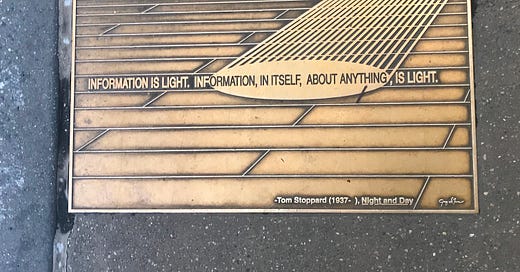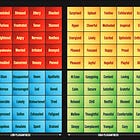Field Notes: June 2025
This month's collection includes a personal story of a DCIS diagnosis, info about S.A.D. in the summer, and invites to two wonderful free events

Hello, dear friends,
Happy June, and Happy Summer! I am feeling a bit out of sorts — how are you? We live in interesting times, at times unsettling and even horrifying, and I must continually remind myself that moments of kindness and connection are their own radical and useful acts. They are contagious in the best ways.
And also, because connecting indoors over Zoom in this sweltering weather is still soothing connection, here are two events coming up Thursday and Monday. Both free, both with lovely humans:
DANCEmandala with Rebecca Sturgeon — Those who have been part of Winter Camp may recognize Rebecca as one of our instructors, who leads this wonderful movement meditation. Moving your body for an hour to music can feel so good. (And if an hour is too much, or your body simply needs to rest, you can also listen and lay down; it’s all about what is best for you.) This is a special free live session ($20 usual price) | Thursday, June 26, 7 p.m. ET | Sign up
How I Used AI to Reclaim My Life From Cancer with Harry Pickens — In this live session with Harry, an extraordinary jazz pianist, author, and educator, he will share how he worked with AI not as a productivity tool, but as a healing ally during one of the hardest seasons of my life. How could you not be intrigued? I am so curious and signed up for the 5 p.m. ET slot. | multiple times available Monday, June 30 | Sign up
Hope to see you at either or both, and hope you find something helpful or delightful below in this month’s Field Notes, a collection of interesting things I’ve run across lately related to health, illness, and thriving.
Stay cool and stay kind, my friends.
To our journeys,
Brianne
Understanding DCIS
“The bad news is you have ductal carcinoma in situ. The good news is that DCIS is the best type of breast cancer to get.”
Julia Stalder was 43 when a pathologist shared her biopsy results with these words. As she writes in a new article in Cure magazine:
I had never heard of DCIS. ‘So, what are the next steps?’ I asked, channeling my inner Type A. The pathologist replied, “You need to schedule an appointment with a breast surgeon.” When I asked if it could wait, he gently urged me to get started.
She continues:
“Studies estimate that 50–80% of untreated DCIS would never become life-threatening. Yet, because we can't predict which cases will progress, nearly all are treated aggressively: surgery, often followed by radiation and five years of hormone therapy.”
After much research, three opinions from surgeons, the harrowing experience of navigating treatment options, Julia launched a nonprofit to help other people with this bewildering diagnosis: DCIS Understood. She ended up choosing active monitoring rather than surgery — an established approach for some prostate cancers, and one that has been since confirmed by a trial study as a reasonable early option for DCIS. I am grateful to Julia for sharing her story:
Read Julia’s story in Cure magazine.
Go to the DCIS Understood website to learn more.
Summer S.A.D.
Annual reminder: Did you know that Seasonal Affective Disorder does not just occur in the winter? About 1% of people suffer from this form of major depression in the warmer months. I first learned about it from cartoonist Summer Pierre last summer. View her cartoon and read a Q&A.
Call for patient perspectives
The Journal of Patient Experience has an open call out for submissions for its special collection on humanism with the Gold Foundation. (I work at the Gold Foundation, a nonprofit that champions humanism in healthcare; this newsletter is separate from my job there, but occasionally I’ll share things that might be interesting to you.)
One submission format is a Patient Perspective: 1,500-word articles that “amplify the voices of those who experience the health and care system firsthand, contributing to a deeper understanding of patient needs, challenges, and outcomes.” (Maybe this is you?) Your article will need to be supported by research, data, or literature that helps give context and credibility. (For example, if you share your perspective from waiting in the ER for hours, you could incorporate stats on the average wait time, how it has risen over the years, the complications/deaths due to longer waits, etc.)
Submissions are accepted on a rolling basis all year, with the final deadline of Dec. 1. I’m happy to answer questions or talk through an idea with you. Journals need more patient perspectives, and I know there are many wonderful writers here!
Learn more about the special collection and submission guidelines.
Making American milk safe
This fascinating story in
follows how pasteurization was discovered as a way to make milk safer — yet it took decades for that understanding to be widespread and laws to change. Two prominent men, who both had children die of milk-borne illness, took opposite sides in helping to advance and prevent pasteurization.It’s stunning to think of how much has changed:
“In 1880, 28.8 percent of babies in nearby New York died before their first birthday. The primary cause of this extreme infant mortality rate was infectious diseases, with milk acting as a major vector of transmission. Raw cow’s milk can carry pathogens including typhoid, diphtheria, scarlet fever, and tuberculosis. All of these were significant killers of children and adults in nineteenth-century America.”
Read the full story.
A Cutting-Edge Cancer Therapy Offers Hope for Patients With Lupus
About 3 million people around the globe have lupus (systemic lupus erythematosus), an autoimmune disease that can cause rashes, joint pain, and fatigue. 90 percent are women. One promising treatment for people with severe lupus is a cancer therapy cancer treatment, CAR T-cell therapy.
“CAR T-cell therapy, a kind of ‘living drug’ that modifies patients’ immune cells to help them attack misbehaving ones, has been used with significant success to treat some cancers, particularly of the blood. A growing body of evidence has suggested that the therapy can also treat a severe form of lupus that, at best, can be managed as a lifelong condition and, at worst, resists treatment and can lead to organ failure and death.”
One of the most hopeful stories I’ve read this month — and a reminder of the importance of government-funded medical research.
Read the New York Times story (gift link).
Your top 10 FAQ on drug prices
Dr. of Your Local Epidemiologist dives into the bewildering world of prescription drug prices.
Why are drug prices in the U.S. so much higher than in other countries?
What policies actually lower drug prices—and are they politically viable
Why are generics cheaper—and are they just as good?
Read the 10 FAQ and get Dr. Jetelina’s take.
New Virginia law limits social media use to 1 hour for those under 16 years old
Did you see this? In Virginia, starting on Jan. 1, 2026, social media platforms are required to limit users under the age of 16 to one hour per day — unless parents consent to allow more time. I’m intrigued.
I tend to think that any friction on the lure of screen time — anything that nudges us to pause, look up, chat, go outside — is good.
I do wonder how easy it will be for the kids to override it, how tempting it will be for the parents to nix it, and what impact that might have on other states. As we often see with California’s leading edge, if one state requires a national company to make a shift, it ends up affecting anyone.
Can you imagine if we all opted into 1-hour limits?
Read the news story.
TSA Cares
I learned from the beautiful humans at the nonprofit Negative Space that TSA has a system set up to help people with disabilities or other issues through the security checkpoint. Fill out the TSA Cares form here. It sounds like it may vary a lot by airport, but it helped Negative Space founder Allison and her husband Sean on their recent trip to see Cynthia Erivo in concert (!!), so I’m calling that a little win and passing it along to you.
Also, if you are a caregiver, visit the Negative Space’s amazing resources.
Yummy chickpeas and zucchini simmered in broth and topped with pesto and ricotta
One of my go-to recipes, especially when zucchini is in season, from the amazing and reliable
of Smitten Kitchen. Basically, this is a crockpot-esque recipe that involves tossing a bunch of ingredients (chickpeas, zucchini, onion, broth, garlic, red pepper flakes, olive oil, salt) into a pot and letting it simmer merrily. At the end, after it’s soft and succulent, add dollops of pesto and ricotta — and enjoy!(I was curious and looked up zucchini, which has vitamin A, vitamin C, beta-carotene, potassium, fiber, folate, and lots of other nutrients.)
Get the recipe at Smitten Kitchen.
What I’m listening to: a jazzy rendition of “Over the Rainbow”
Hat tip to Harry Pickens for sharing the link to this super enjoyable jazz version of “Over the Rainbow” with fellow jazz pianist Emmet Cohen and the Havana Chamber Orchestra. Seven splendid minutes that left me feeling relaxed and energized. Hope it does something similar for you!






